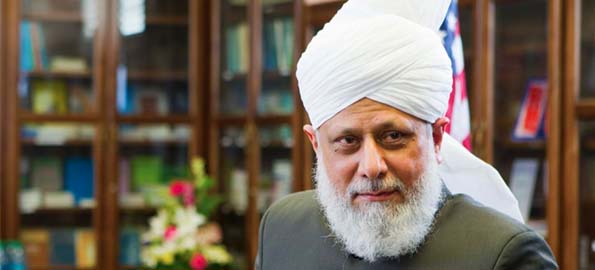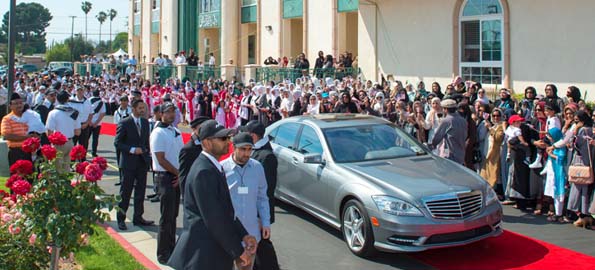CHINO, Calif.—This week, thousands of families arrayed in their colorful best are crowding into a sprawling mosque set among the golden hills of this old agricultural community east of Los Angeles. Some have come from across the country, and some from as far as Ghana. A few even risked travel out of Syria.
They clamor to see Mirza Masroor Ahmad, a subdued, 62-year-old former wheat farmer and the world’s only “Muslim Pope.”
The khalifa, as he is called, is the spiritual leader the Ahmadi Muslims, a small sect of Islam with followers spread across the globe and concentrated in Pakistan, Southeast Asia and West Africa.
There are an estimated tens of millions of Ahmadi Muslims throughout the world—a minority within the global estimated 1.6 billion Muslims. In the U.S., Ahmadis number only about 25,000. But in recent years, the group has managed to gain a surprising amount of attention and political clout in the U.S., challenging extremist rhetoric and touting Islam as a religion of peace.
On Saturday, U.S. officials, including members of Congress, representatives from local and federal law enforcement, California’s lieutenant governor and the state controller, gathered in Beverly Hills to hear the khalifa speak about terrorism and human rights.
U.S. politicians consider Ahmadis valuable contacts among the American Muslim community at a time when those relationships are strained by terrorist acts in the name of Islam and fears of profiling.
The khalifa is “the world’s leading Muslim figure promoting peace and harmony,” Ahmadi literature says.
The catch: Most Muslims say Ahmadis are not Muslim.
The sect, founded in India more than 100 years ago, is viewed as heretical among much of the Muslim world because of a theological dispute that started with their founder, who claimed to be the metaphorical second coming of Jesus Christ, sent to reform the practice of Islam and press for nonviolence. That contradicts a central tenet of Islam that says Muhammad was the last prophet.
In Pakistan, the estimated four million Ahmadis aren’t allowed to identify themselves as Muslim or vote as Muslims. Attacks on the community there in 2010 left 99 Ahmadis dead.
In some countries they are banned from making the Haj, or pilgrimage to Mecca, in Saudi Arabia. The khalifa lives in exile in London.
Ahmadis “tend to be pariahs within the mainstream Muslim community and around the world,” said Donald K. Emmerson, a specialist in Islamic history at Stanford University.
But that hasn’t slowed their efforts in the U.S., where in recent years they have ramped up their profile by hosting community blood drives and making television appearances defending Islam.
After the failed Times Square bombing in 2010, Ahmadis flooded the New York City locale to hand out leaflets as part of a “Muslims for Peace” campaign.
Unlike the larger Muslim world, which has many local and regional leaders but no singular hierarchy, the Ahmadis are organized under a clear structure that allows them to quickly mobilize public campaigns and lobbying efforts, their leaders said.
In speeches, sermons and interviews the khalifa has advocated for the separation of religion and government, and urged Muslims in the U.S. to “be loyal to this country.” The group doesn’t focus on issues of profiling or civil rights with U.S. leaders.
That strategy has helped win the group access to U.S. politicians. The khalifa has met with House Minority Leader Nancy Pelosi (D., Calif.), and the Ahmadis garnered the support of Senate Minority Leader Mitch McConnell (R., Ky.), who pushed for Ahmadi rights in Pakistan.
“Ahmadi Muslims continue to demonstrate an unwavering dedication towards peace, freedom and harmony,” said U.S. Rep. Mike Honda, a Democrat from California who has met with the Ahmadis.
In an interview in the library of the Chino mosque, where the white-bearded khalifa was visiting for the first time this week, he said “the only gain I want from [U.S. leaders] is to make some program to create and develop peace in the world,” and warned of a “world war” that could result from turmoil in the Middle East.
With some success, Ahmadis have also pressed their own agenda.
“They are a persecuted group, it makes sense for them to have political allies who might be able to put pressure” on governments abroad in order to help their brethren, said Jeremy Menchik, and assistant international relations professor at Boston University.
Last month, 32 members of Congress signed a letter to Secretary of State John Kerry, saying “we cannot stand idly by and allow 4 million Ahmadis to remain disenfranchised and outside the electoral process,” by not being allowed to vote in Saturday’s elections in Pakistan. Mr. McConnell and Sen. John Cornyn (R., Texas) sent a separate letter to Mr. Kerry on the same issue.
A State Department spokeswoman said the letter from the two senators had been received, but had no further comment.
As the weekend election took place, the khalifa addressed political leaders at the Montage, a luxury hotel in Beverly Hills. He then retreated to Chino, where many Ahmadi Muslim families—mostly immigrants from Pakistan—have bought homes near the mosque, and who were expected line up day after day just for three minutes with their khalifa before he leaves California this week.
He hopes to meet with as many families as he can—and, he added with a smile, for one more thing: “I’d like to see a farm.”



